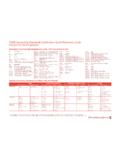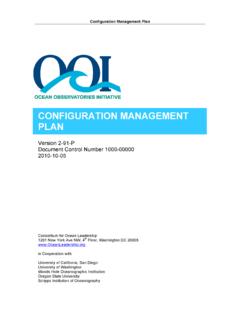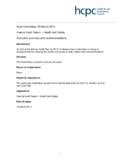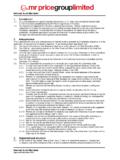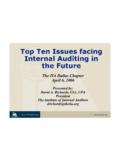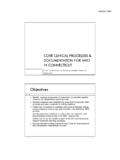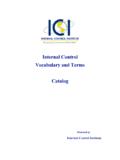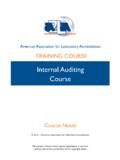Transcription of How Do Internal Auditors Add Value? - drlillie.com
1 How Do Internal Auditors Add value ? By JAMES ROTH Characteristics common to top rated audit shops help to shed light on the nebulous concept of adding value . THE DEFINITION OF " value ADDED" CAN VARY considerably from one audit department to the next. For many practitioners, this phrase describes audit work that helps management improve the business, rather than assignments that simply verify compliance with policies and procedures. For others, the opposite meaning may apply. I remember, for example, asking a wise Internal auditor to describe his department's innovative, value -added audit practices. Rather than discussing his own department, the auditor helped to broaden my understanding of adding value by saying, "Remember .. what adds the most value in a country where, for instance, corruption is prevalent, is compliance auditing." The type of work or services that constitute value -added practice, then, is largely situation specific.
2 What adds the most value for one organization, or even one area within an organization, might be a waste of resources somewhere else. Hence, the influence of individual circumstances gives rise to the question, "How can Auditors identify the practices that will add the most value given their own specific situation?" An obvious answer is, "Ask your stakeholders." Many Auditors seem to have taken this approach, as evidenced by a recent survey conducted by The Institute of Internal Auditors (IIA) titled, " value Added Services of Internal Auditing" (see " value -added Practices" for survey parameters). The results show that 52 percent of surveyed Internal Auditors had gone through a major "reinvention" to add more value and that, within this segment, 95 percent gathered verbal and/or written input from one or more of their major stakeholder groups. Soliciting input from stakeholders, however, is only part of the answer.
3 If we rely solely on stakeholders to decide what types of services would add the most value , we limit ourselves to their knowledge of Internal audit practices. But stakeholders are only aware of what they ve seen us accomplish in the past. Given the major advances in our profession during the last decade, stakeholders' expectations are likely far lower than they should be. For this reason, Auditors need to raise stakeholders' expectations by telling them or, better, showing them how much value we can add. At the same time, we cannot adopt an exciting new practice without adapting it to the organization's culture and the stakeholders' needs. Some audit departments that tried control self-assessment workshops, for example, failed miserably. Either workshops couldn't be made to fit the organization's culture, or the Auditors neglected to do the careful planning and tailoring needed to ensure the success of such what constitutes value -added activity will vary based on many factors, there are some general rules that apply across the board.
4 Based on more than 10 years of researching Internal audit best practices, I've identified four factors that can help Auditors determine what will add the most value to their organization: A deep knowledge of the organization, including its culture, key players, and competitive environment. The courage to innovate in ways stakeholders don't expect and may not think they want. A broad knowledge of those practices the profession, in general, considers value added. The creativity to adapt innovations to the organization in ways that yield surprising results and exceed stakeholders' expectations. Three of these factors organizational knowledge, courage, and creativity represent competencies and personal qualities that, for the most part, are self-explanatory. "Practices the profession considers value added," however, leaves much room for interpretation, and thus merits further attention.
5 Although reaching a consensus on profession-wide best practices may be nearly impossible, the research I've conducted helps to shed light on commonalities among leading audit departments. By consolidating these common qualities, I've created a profile of a value -adding audit department that may be helpful to Auditors seeking to benchmark their own departments and provide potential ideas for positive change. PROFILE OF A value ADDING AUDIT DEPARTMENT To identify audit practices that add the most value , I began with a list of world-class departments nominated by participants in The IIA's Global Auditing Information Network. Next, I expanded this list based on my own observations and through information collected while networking with peers. I then narrowed the candidates to only a handful of departments by using a subjective process of elimination that included ensuring each chosen company represented a different industry and avoiding inclusion of departments whose practices were considerably alike.
6 Despite the significant diversity in their specific practices, I observed remarkable similarities in certain key areas among the final departments selected. Considered excellent by their peers, and representing a variety of sectors, these audit shops form a collective profile with the following five value -adding characteristics. 1. EXTENSIVE STAFF EXPERTISE The model of Internal auditing as a training ground for recent college graduates is fading. Organizations demand more tangible valuefrom audit work than newcomers to the profession can typically deliver. In fact, an average of 10 years' business experience is not unusual in leading audit departments. Top-notch audit staffs are multi-disciplinary, with experts such as engineers and accountants or individuals versed in other disciplines needed to thoroughly understand the business rotating through the department.
7 A core of experienced audit practitioners, however, provides continuity and in-depth knowledge of audit skills. Furthermore, these departments tend to be highly trained, with 75 percent or more staff members who are certified most with the certified Internal auditor, certified information systems auditor, certification in control self-assessment, or certified government auditing professional designation. Members of these audit functions also tend to be particularly active participants in their local professional organizations. The best Auditors are also skilled in data analysis, using audit software to solve business problems no one else in the organization can master. In addition, many practitioners are becoming integrated Auditors , combining information-technology and business-audit skills. Although this concept has existed for at least 15 years, many audit departments have only recently begun to succeed with it in practice.
8 Beyond in-house staff, world-class departments are complementing their own resources with selective outsourcing. Even a large audit staff cannot maintain in-depth knowledge of every computer application, investment product, and benefit plan in the organization. In fact, 45 percent of respondents to The IIA's value -added Services survey used outside contract Auditors to either cosource select assignments or outsource a substantial portion of their work. Of these, the average amount of work outsourced was 19 percent. Though well-staffed and endowed with a broad range of expertise, many of the best audit shops are still finding the need to enlist outside help. 2. A CHALLENGING WORK ENVIRONMENT Talented, motivated staff members are easily bored and require challenging work. Their creativity must be encouraged and rewarded, and their professional challenges must extend beyond regular audit assignments.
9 The departments I researched, for example, tend to involve staff Auditors extensively in decision-making processes. Every staff member helps determine the direction of the department, and volunteer teams not just the audit managers develop the department's new practices. This approach to staff oversight does not represent laissez faire management. Instead, the department leader creates and then closely monitors processes that enable the employees to participate in management decisions. In addition, the leader ensures the audit department is a fun place to work a necessary component for creativity and projects a tone at the top that shapes a value -adding culture. The culture established by these departments emphasizes partnership over independence, while never losing objectivity. Auditors are encouraged to be trainers, coaches, and counselors of Internal control, not just evaluators.
10 They are taught to always look for ways to improve the business instead of simply identifying control ORGANIZATIONAL ALIGNMENT Leading audit departments that employ two or more audit managers typically align their departmental structure with that of the organization. That is, the audit managers are assigned to specific lines of business, where they develop in-depth knowledge of business-unit activities and long-term relationships with those in charge. This structure is complemented by the use of "relationship managers" usually experienced Auditors but sometimes all members of the department who are assigned to specific areas within the lines of business. Their job is to stay in touch with the area managers. Contact might consist of formal meetings at an assigned frequency or impromptu discussions. During both types of meetings, the Auditors inquire about changes in the area that might lead to new risks, share best practices they ve identified in other areas, and discuss common control weaknesses discovered among other departments.
